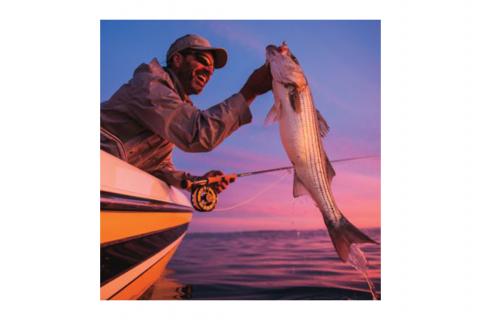
Saltwater covers two-thirds of the Earth and contains the most powerful fish on the planet. Catching one of these incredible specimens is an exhilarating experience that should not be passed up. However, fishing this unique environment wrecks gear, so anglers need equipment that can withstand saltwater.
Rods
Salt causes corrosion so saltwater rods need to have corrosion-resistant components, such as anodized real seats. They are typically fast- to very-fast-action rods that throw tight loops at high speeds when paired with the proper fly line. This is important because saltwater conditions are generally windy and line helps power your fly through blustery weather.
Reels
A corrosion-resistant or sealed drag that can handle blistering runs is vital when it comes to saltwater fishing. Machined reels are best because they can be anodized to resist saltwater corrosion.
Because of the low startup inertia on cork drags (see Fly Reel Buyer's Guide), many people prefer to use them with their saltwater outfits. The drawback is cork has to be manually lubricated by the user, making a sealed cork drag implausible. Because the drags aren’t sealed, saltwater causes them to corrode and wear out quickly.
Synthetic drag systems are heralded because they can last a lifetime. Also, they are self-lubricated, so there is no need to lubricate them yourself (in fact, you shouldn’t). It’s possible to seal them so they resist the harmful effects of silt and saltwater. They have higher startup inertia than cork drags, meaning they do not protect tippets as well as cork during the beginning of runs. However, the difference is marginal, and as long as you use a tippet with the proper breaking point, this should not be a problem.
So, when it comes to your saltwater reel, you have to decide if the slightly lower startup inertia of a cork drag is worth the added maintenance and shorter life span. If it is, cork is your best option. However, if you want a reel that will perform well and last a lifetime, a sealed synthetic drag is the way you should go.
Lines
The warmth of saltwater conditions means a line with a stiff core is needed. Many tropical lines incorporate a very aggressive front taper, which helps you turn over large flies and get the distance you need, even when facing a stiff wind. Long casts are often required for most types of saltwater fishing, so choosing a properly weighted line is necessary (see Fly Lines Buyer’s Guide: Line Weight). Using a line with a slickening agent is helpful, as this increases line speeds. Lastly, a coating with UV inhibitors reduces the sun’s effects on your fly line, extending its life.
Flies
Saltwater flies are susceptible to corrosion just like other saltwater gear. They should be tied on a stainless steel hooks to resist corrosion.
- 2622 views

